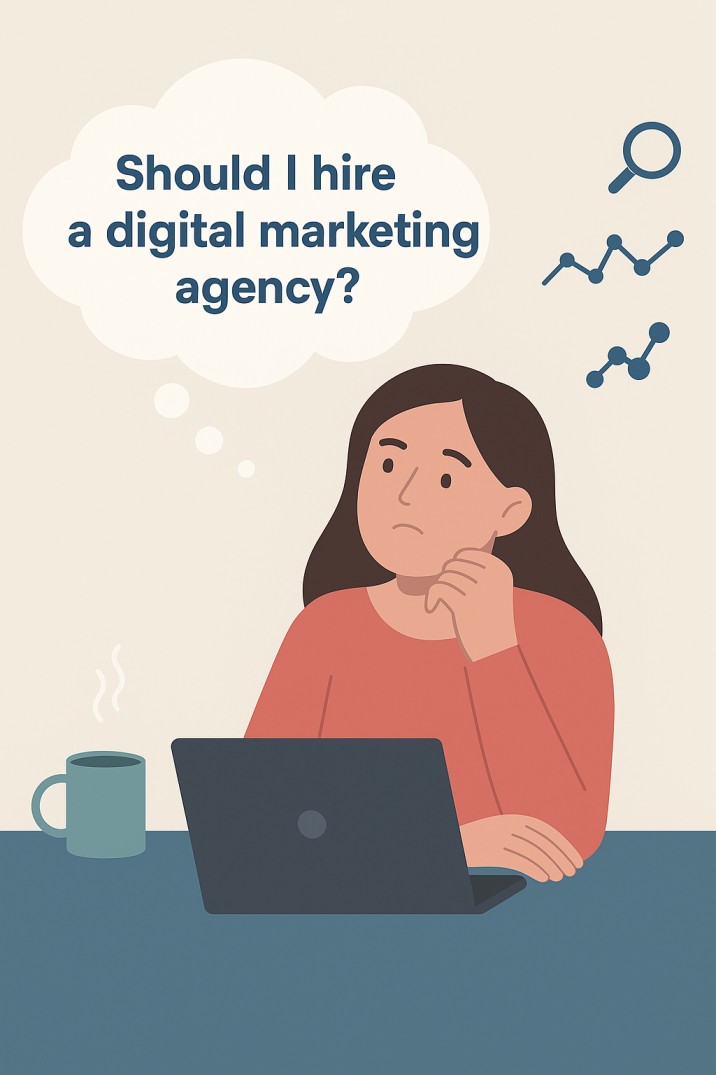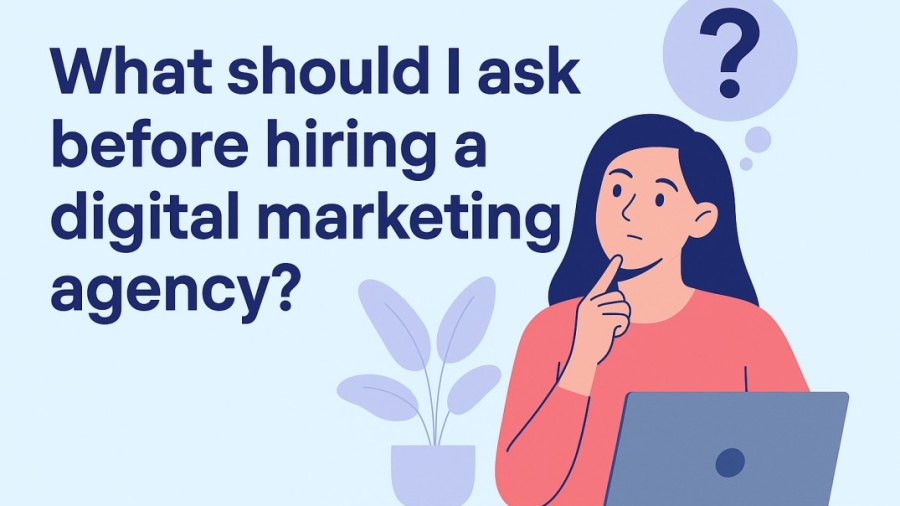Hiring a digital marketing agency sounds like a no-brainer when you want more customers and more reach. But it’s not as simple as picking the first one you find on Google. Agencies vary wildly in skill, approach, and integrity. Some will change the way you do business for the better. Others? Let’s just say you’ll wish you had asked a few more questions first.
Below, I’ve pulled together the most important — and often overlooked — questions to ask before signing anything. These aren’t trick questions. They’re conversation starters that reveal how an agency actually works when you’re not in the room.
1. Why is it important to ask questions before hiring a digital marketing agency?
It’s tempting to assume that if an agency has a slick website and a few testimonials, they must know what they’re doing. But marketing is a partnership. You’re trusting them with your money, your brand voice, and sometimes your reputation.
By asking the right questions, you’re doing three things:
- Protecting yourself from mismatched expectations.
- Making sure they understand your business.
- Testing their transparency — because if they can’t answer basic questions now, how will they handle complex ones later?
And honestly, sometimes the way they answer matters more than the words themselves. If they sound rehearsed or vague, that’s a sign.
2. What services should a digital marketing agency actually offer?
Not every business needs every service under the sun. But a well-rounded agency should at least cover the basics:
- Search Engine Optimization (SEO) — so people can actually find you.
- Pay-Per-Click Ads (PPC) — Google Ads, Meta Ads, maybe LinkedIn if it fits your audience.
- Social Media Marketing — content creation, posting, and engagement.
- Email Marketing — yes, still effective if done right.
- Content Creation — blog posts, videos, graphics, etc.
Some agencies will also handle branding, website design, or even public relations. That’s great, but don’t let them upsell you on services you don’t need.
3. How do I know if they understand my industry?
It’s not just about them having “worked with similar businesses.” Ask them to explain your audience back to you. If they can’t clearly describe your customers’ needs, pain points, and decision-making habits, that’s a problem.
Also, ask for industry-specific examples:
- Have they run campaigns for your type of customer before?
- Do they know your competition?
- Can they suggest quick wins based on your niche?
Agencies that can’t speak your language will struggle to get your audience’s attention.
4. Can they show real examples of measurable results?
Any agency can claim they “boosted engagement” or “increased brand awareness.” But what does that mean in numbers?
Look for specifics:
- Revenue increase percentages.
- Return on Ad Spend (ROAS).
- Cost per acquisition (CPA) reductions.
- Lead volume growth.
If they dodge numbers or can’t provide data beyond vanity metrics like likes and impressions, keep moving.
5. Who will be my main point of contact, and how often will we communicate?

This one’s overlooked all the time. You might meet the agency’s charming founder during the sales call, but once you sign, you could be handed off to a junior account manager you’ve never met.
Ask:
- Who exactly will manage my account day to day?
- How often will we meet? (Weekly? Monthly?)
- Will I have direct access via email or phone?
Good communication isn’t a bonus; it’s a necessity.
6. How do they track performance and report progress?
Reports should be clear, consistent, and focused on the metrics that actually matter to you.
Ask:
- What reporting tools do you use? (Google Analytics, Data Studio, proprietary dashboards)
- How often do you send reports?
- Will you explain the results in plain language?
If their reports look like a wall of numbers without context, you’ll waste time trying to decode them.
7. Do they handle all work in-house or outsource?
Outsourcing isn’t necessarily bad. Many agencies work with trusted freelancers or partner firms for specialized tasks like video production or advanced coding.
But you should know:
- Who’s actually doing the work.
- Where they’re based.
- How quality control is managed.
The more middlemen involved, the harder it is to keep consistency.
8. What tools and platforms do they use?

Tools can make or break efficiency. Ask about:
- SEO tools (Ahrefs, SEMrush, Moz).
- Ad management tools (Google Ads Manager, Meta Business Suite).
- Social scheduling tools (Hootsuite, Buffer).
- Analytics dashboards.
You’re not looking for a magic toolset, but you do want to know they’re using professional-grade software — not just spreadsheets and guesswork.
9. What’s their pricing structure, and are there hidden fees?
Agencies price their services in different ways:
- Monthly retainers.
- Project-based fees.
- Performance-based models.
Ask them to break down exactly what’s included. Also, clarify what happens if you need extra work outside of the agreement. No one likes surprise invoices.
10. What happens if I’m not satisfied with the results?
This is where you find out how they handle accountability. Will they adjust strategy without extra charges? Offer partial refunds? Or do they hide behind “marketing takes time” forever?
Results take time, yes. But a good agency will have a clear process for course-correcting if things aren’t working.
11. How do they stay updated with marketing trends and algorithm changes?
Digital marketing changes fast. What worked six months ago might not work now.
Ask:
- How do you stay informed about updates (Google algorithm changes, platform policies, new ad formats)?
- Do you train your team regularly?
Agencies that don’t invest in learning will eventually fall behind.
12. Will they require a long-term contract?
Long-term contracts aren’t inherently bad — they can ensure commitment and stability. But they shouldn’t be used to trap you in a relationship that’s not working.
Ask if they offer shorter trial periods or flexible agreements. If they demand a year-long contract right away, that’s a red flag.
13. Can they adapt strategies if my business goals shift?
Your priorities might change mid-year. Maybe you launch a new product or need to focus on retention instead of acquisition.
Ask how they handle strategy pivots. The best agencies can adjust campaigns without starting from scratch (or charging you for it as if they did).
14. Do they have experience working with businesses of my size?
Working with a local bakery is very different from managing a global e-commerce brand. If you’re small, you don’t want an agency that only knows how to work with Fortune 500 budgets.
And vice versa — if you’re large, you don’t want a team that’s never managed a multi-channel, high-budget campaign.
15. What makes them different from other agencies?
Some will say “customer service” or “results.” But push for specifics:
- Do they specialize in a certain niche?
- Do they have a proprietary process?
- Do they offer guarantees?
If their answer sounds like it could belong to any agency, they probably haven’t thought it through.
Final Thoughts
Hiring a digital marketing agency is a big decision. The right one can feel like an extension of your own team, helping you grow faster and smarter. The wrong one can waste months — and thousands of dollars — while leaving you worse off than when you started.
The key is to treat your first meeting like a job interview where you are the one doing the hiring. Ask these questions. Listen carefully. And trust your gut when you hear the answers.
About Shree Krishna Gauli
I’m a Digital Marketing Specialist who’s worked with brands in the U.S. and internationally, helping them grow through data-driven strategies, creative campaigns, and strong online presence. Whether it’s SEO, social media, or paid ads, I focus on results that actually matter to the business.
Learn more at shreegauli.com or connect at contact@shreegauli.com.

